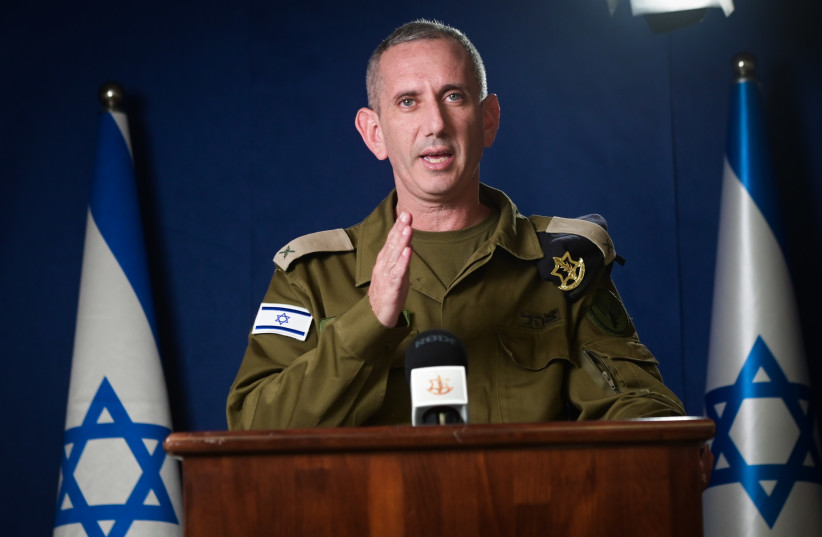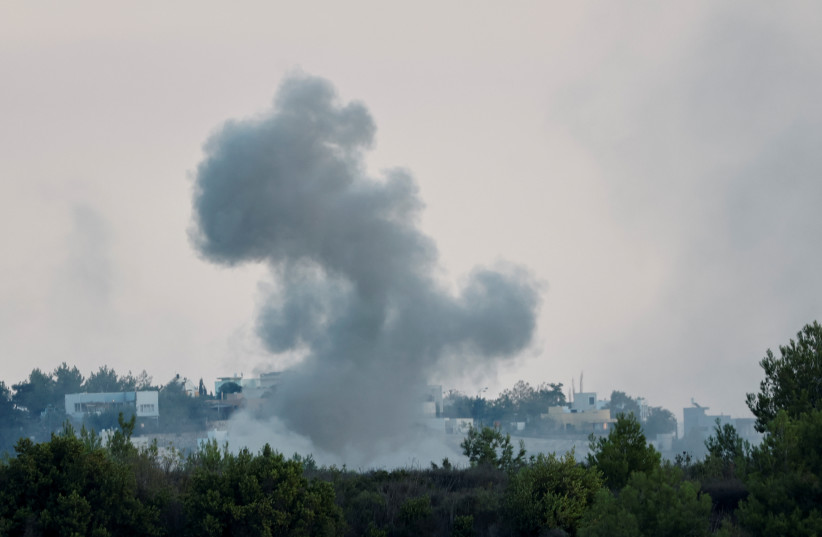Iran ordered Hezbollah to escalate against Israel on Sunday, IDF Spokesperson Brig. Gen. Daniel Hagari said in his Monday morning press conference.
"If Hezbollah fails to understand us, the response will be deadly," said Hagari repeating the sentence for emphasis.
There has been an ongoing debate about whether Iran was involved more generally, with general training, funding and logistics support, or with specific direction and responsibility for Hamas' invasion of the South on October 7, but Hagari was unambiguous about his accusation on Monday.
Sirens were heard in western Galilee on Sunday afternoon close to the Lebanon border in the towns of Nahariya, Rosh Hanikra, Hanita, Gesher HaZiv, Betzet, and Shlomi.

Hamas in Lebanon took responsibility for the rocket fire.
A spokesperson for the Galilee Medical Center in Nahariya announced they received eight people who had been wounded by the rocket fire.
Two were taken to the trauma center, they are in serious but stable condition, both suffering from shrapnel wounds to their limbs, with one more suffering similar injuries but being in moderate condition.
The remaining five wounded people are in light condition and were undergoing tests in the emergency room mainly for smoke inhalation and head injuries at press time.
The IDF responded by attacking military infrastructure in southern Lebanon with helicopters.
Besides Hamas in Lebanon, there were also reports of Hezbollah firing systematically to destroy IDF border surveillance equipment to blind its early warning invasion capabilities, much as Hamas made sure to eliminate many IDF border surveillance capabilities on October 7 as it was invading Israel's Gaza corridor. The IDF returned fire, but Hezbollah has been claiming publicly that it is hitting Israel harder than the hits it is receiving in return.
Further, Hezbollah took responsibility for the firing of anti-tank missiles at IDF outposts near the Lebanon border, killing one man and wounding four others.
As a result, the IDF announced on Sunday the creation of a four-kilometer "security zone" on the border to prevent any non-residents from entering the area.
Defense Minister Yoav Gallant warned Hezbollah to start lowering the temperature and that Israel's patience with its ongoing keeping the northern border tense could run out, but that Israel also did not want to get into a war in the North.
A Hezbollah spokesperson said: "There are incidents on the border, this does not mean that Hezbollah has decided to fully enter the war."

UNIFIL headquarters hit by rocket in southern Lebanon
United Nations peacekeeping force UNIFIL said on Sunday its headquarters in south Lebanon had been hit by a rocket.
"Our headquarters in Naqoura was hit by a rocket and we are working to verify from where. Our peacekeepers were not in shelters at the time. Fortunately, no one was hurt," UNIFIL said in a statement.
There have been repeated periodic incidents where Hezbollah or its supporters have attacked UNIFIL personnel with the peacekeeping group nearly always turning the other cheek and trying to downplay incidents.
UNIFIL has been deterred from conflict with Hezbollah since the early years of its mandate after the 2006 Second Lebanon War when the terror group was extremely aggressive against UNIFIL if and when it tried to disarm any Hebzollah forces.
Hagari also said that "the US's stance is with actions, which are being understood in all of the Middle East," in a clear reference to Hezbollah and Iran.
Despite Hagari's statement about the US discouraging others in the Middle East, Hezbollah's provocations on the northern border have continued almost daily since the early days of the war.
Still, Hezbollah has not yet jumped into the war in a larger scale way.
